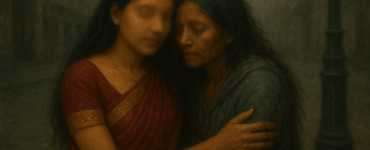“Literature is the mirror of the society”, they say. So, when Bibhutibhushan Mukhopadhyay wrote the book Kushipranganer Chithi, he was not just documenting the Kosi belt, he was recounting the lives of people of that region as well, embroidering a tapestry with threads of memory and myth, history and heart. He was a cherished friend of my great grandfather Satyendra Mohan Chowdhury, and their friendship unfolded within the walls of our ancestral bungalow at Narpatganj (Dhana), North Bihar, during Bibhutibhushan’s visits to the Kosi region. In those days, their exchange of letters was like a conversation that spanned the depths of time. They were intimate conversations, where the minutiae of everyday life were exchanged. Sometimes, nestled behind the percale of the folded inland letters, he would leave a few lines for my mother, who was then a newlywed daughter-in-law in the family, and a bibliophile. The letters were soaked in affection, like roses pressed between pages. How I wish those letters had been preserved, drenched in the lingering aroma of the bygone era. But though the letters are lost in time, their essence endures, in stories cascaded down to us by my grandfather and mother, in the lullabies my mother still croons, and in the eternal petrichor of our ancestral soil.
Our roots stretch deep – across lands and rivers. Far away, in Madanpur village of the Mymensingh subdivision, nestled in the Faridpur district of present-day Bangladesh, stood the ancestral bungalow of my great-grandfather’s father, Dr. Madanmohan Chowdhury. A man of intellect and philanthropy. He was appointed as Police Surgeon/doctor at Alipur Central Jail in Calcutta in 1872. By 1887, his fate led him to North Bihar, where he served at the Pratapganj Police Hospital—a time when Pratapganj was a thriving junction, with its own police station and the pulse of a growing township. From that legacy was born my great grandfather, Satyendra Mohan Chowdhury in 1895 – a man shaped by lineage yet defined by his own strength and resolve. He received his education at the prestigious Maharaja Kameshwar Singh Vidyalaya of the Darbhanga State. He studied medical in Darbhanga Medical College but left it halfway after his father’s demise, and later found his calling in a field starkly different than that of a doctor. He earned supreme fame as a formidable wrestler in the royal courts of Darbhanga Raj. His name, they say, rang out through the darbar after every triumphant bout, his strength matched only by his quiet dignity. In 1912, he married my great grandmother at Pacchar. It was the village where the family branched out even further, embedded in its land, culture, and people and the generational relationships they nurtured.
My family’s roots spanned across the length and breadth of Bihar. While my grandfather pursued his medical education at Carmichael Medical College in Rangpur, now in Bangladesh, his brothers and cousins remained in North Bihar, studying in places like Ganpatganj and Forbesganj—then bastions of education.
My great-grandfather’s elder brother was a distinguished doctor, a gold medallist recognized for his excellence in medicine. His dedication to his patients was beyond compare. He was selfless and unwavering. Yet, even the noblest lives are not immune to the forces of nature. When the catastrophic Kosi flood and the devastating earthquake of 1934 struck, he would wade through neck-deep waters to reach his ailing patients. It was during one such act of service, while braving the floodwaters of the Kosi—aptly called the “Sorrow of Bihar”, that he tragically drowned. Our ancestral bungalow in Pratapganj, once a grand structure echoing with memories and pride, was also claimed by the disaster. What once stood as a symbol of legacy and strength was reduced to ruins. Pratapganj mourned deeply, not just for the loss of a home, but for the passing of a doctor whose service had elevated him to near-divine reverence in the community.
In the aftermath, my great grandfather moved to Narpatganj from Ganpatganj and he built another bungalow there, which was a place then still raw and untamed, evoking the mythical Tepantor—a wild, riverine land of dense jungles and lurking dacoits. But into such a lawless land did my great grandfather get sent as the Manager of the Harawat Estate. The position was challenging in spirit, which required foresight and patience. He became General Manager within two years and then the estate’s Attorney General —a testament to his unwavering strength and irreplaceable spirit.
He built his own enormous kingdom in Narpatganj, not only with wealth or power, but with vision and compassion. It was there that his greatness shone brightest. What was once a stretch of wilderness, he transformed into a thriving settlement. He called the people together, offered land freely to the landless, and invited families to settle. With the help of the local people, he slowly turned the wild terrain into a fertile farming village. He was a man far ahead of his time. A deep believer in education. He was a voracious reader himself. The home library he curated is very close to my heart. It’s vast and dignified, each book bearing the elegant stamp: “Chowdhury’s Home Library.” It housed rare editions, timeworn volumes, and the scent of yellowed pages touched by generations. That library stands today, echoing with the silence of learning and legacy. But aside from book collection and reading, my great grandfather encouraged others to learn. His actions spoke louder than any proclamation. He donated acres of land for the establishment of primary, middle, and high schools—the legacies that live on today—but he never permitted his name to be inscribed on any cornerstone. For him, service was duty, not display, a silent offering, rooted in humility and purpose. It is a legacy my father carries forward to this day. His devotion did not go unnoticed. The British Government honored him with Rai Saheb title and a membership of the Purnea District Board. I’ve often heard my father repeat a saying that seems to echo the very spirit of our lineage:
“If you give with your right hand, even your left hand should not know of it.” It’s not just a proverb to him. it’s a principle he lives by. It is this quiet generosity that has won him countless hearts over the years. To many, my father is not just a man, but they regard him as a divine presence, a guiding light whose compassion and philanthropy lights up others’ lives. But my father’s story is for another day and time.
Our family was a constellation of brilliance, each member a dazzling thread in the filigree of legacy. My great grand uncle, Dr. Surendra Mohan Chowdhury, as mentioned earlier, was the gold medallist of Calcutta Medical College—I rarely referred to him by name but always recognized him by his reputation. My great grandfather’s brother was a lawyer in Araria Court—a humble man who delivered justice quietly. Even my grandfather belonged to this lineage. He began his distinguished medical career by pursuing LMF, and after establishing his own practice in Narpatganj. He served as the local physician for the community. His siblings achieved remarkable things as well. Fanindra Mohan Chowdhury was connected with the Patna Secretariat, rising to the position of Superintendent of Sales Tax; Shivendra Mohan Chowdhury was a trained pharmacist in Calcutta who owned a large medical store in Pratapganj—he was well-known for miles around for his empathy and professionalism. One of their first cousins, Mr. Robi Roy worked in Patna as an IPS officer.
As a child, I remember our mornings rising gently to the strains of Rabindrasangeet, flowing from the Murphy radio. Our home felt like living folklore. Pet elephants and horses wandered our courtyards—more than animals, they were part of our story. The household, bustling with dozens of helps, pulsed with a rhythm of discipline, empathy, and service. One detail I can never forget: our babysitters were first taught Bengali before they were entrusted with our care. I was homeschooled in Bengali, because in our home, one’s mother tongue was sacred. And to this day, I thank my grandparents for that choice, because had I not known Bengali, I would have missed the endless treasure that is Bengali literature.
History may scatter its documents, but memory keeps the music alive. It lingers in the schools built on gifted land, in the settlements carved out of wilderness, in the quiet discipline of our mornings, and in the strains of Rabindrasangeet that still echo through memory.
So when Bibhutibhushan Mukhopadhyay wrote Kushipranganer Chithi, he did more than document a place. He captured the very soul of people of that region. In my great-grandfather, he found not just a zamindar, but a custodian of lives—a man who gave freely, never asking for his name to be remembered. The world may one day forget the archives, but it cannot overlook the quiet majesty of Rai Saheb Satyendra Mohan Chowdhury—fondly remembered as Khokha Babu. More than just a prominent mention in the book Kushipranganer Chithi, his name continues to be revered, even deified, by the people of that region to this day.
As an elder one once reflected, ‘Khokha Babu was the light that illuminated our path.”
*









Add comment